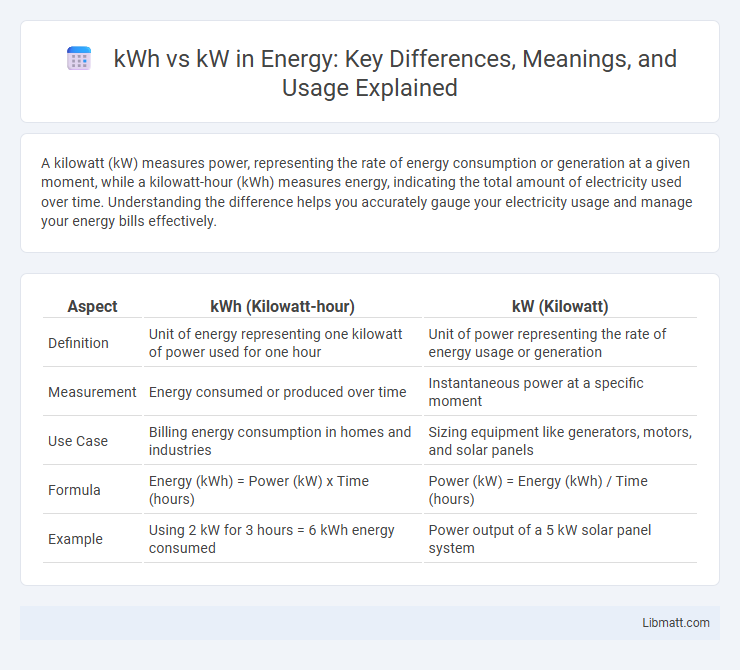A kilowatt (kW) measures power, representing the rate of energy consumption or generation at a given moment, while a kilowatt-hour (kWh) measures energy, indicating the total amount of electricity used over time. Understanding the difference helps you accurately gauge your electricity usage and manage your energy bills effectively.
Table of Comparison
| Aspect | kWh (Kilowatt-hour) | kW (Kilowatt) |
|---|---|---|
| Definition | Unit of energy representing one kilowatt of power used for one hour | Unit of power representing the rate of energy usage or generation |
| Measurement | Energy consumed or produced over time | Instantaneous power at a specific moment |
| Use Case | Billing energy consumption in homes and industries | Sizing equipment like generators, motors, and solar panels |
| Formula | Energy (kWh) = Power (kW) x Time (hours) | Power (kW) = Energy (kWh) / Time (hours) |
| Example | Using 2 kW for 3 hours = 6 kWh energy consumed | Power output of a 5 kW solar panel system |
Understanding kW and kWh: Key Definitions
Kilowatt (kW) measures power, representing the rate at which energy is used or produced, while kilowatt-hour (kWh) quantifies energy consumption over time. Understanding the distinction between kW and kWh is crucial for managing your electricity usage effectively and accurately interpreting utility bills. Power in kW shows instant demand, whereas kWh reflects total energy consumed or generated during a specific period.
The Core Differences Between kW and kWh
kW (kilowatt) measures the rate of power or how much energy is used or generated at a specific moment, while kWh (kilowatt-hour) quantifies the total energy consumed over time. Understanding this distinction helps you accurately assess your electricity usage and manage energy costs effectively. kW reflects instantaneous power capacity, whereas kWh represents actual energy consumption or production during a given period.
How kW Measures Power Output
Kilowatt (kW) measures power output by quantifying the rate at which energy is produced or consumed, reflecting the instantaneous capacity of electrical devices or systems. It directly indicates how much electrical power your equipment delivers or requires at any given moment, unlike kilowatt-hours (kWh) which track total energy usage over time. Understanding kW helps optimize energy efficiency by aligning power demands with system capabilities.
What kWh Reveals About Energy Consumption
kWh (kilowatt-hour) measures the total amount of energy consumed over time, providing insight into how much electricity is used by a device or household during a billing period. Unlike kW (kilowatt), which indicates the power or rate of energy use at a specific moment, kWh reveals overall consumption patterns and helps calculate electricity costs. Understanding kWh enables consumers to monitor energy efficiency and identify opportunities for reducing electricity usage.
Why Confusing kW and kWh Leads to Miscalculations
Confusing kW (kilowatts) and kWh (kilowatt-hours) can lead to major miscalculations in energy usage and costs because kW measures power capacity while kWh quantifies energy consumed over time. Your electric bill is based on kWh, not instantaneous kW demand, so interpreting these units incorrectly can result in overestimating or underestimating actual consumption. Understanding the distinction ensures accurate energy monitoring and financial planning in home or business electricity management.
Practical Examples: kW vs kWh in Daily Life
A 2 kW electric heater running for 3 hours consumes 6 kWh of energy, illustrating the difference between power (kW) and energy usage (kWh). Household appliances like a 1500W microwave use power measured in kilowatts, while the electricity bill charges based on total kWh consumed over time. Understanding that kW represents instantaneous power and kWh accounts for cumulative energy consumption helps optimize daily energy use and reduce costs.
Calculating Energy Bills: The Role of kWh
Energy bills are primarily calculated based on kilowatt-hours (kWh), which measure the total amount of energy consumed over time. Kilowatts (kW) indicate the rate of power usage at a specific moment but do not reflect overall consumption. Understanding kWh allows consumers to accurately assess their energy usage and manage costs effectively.
kW Ratings in Home Appliances Explained
kW ratings in home appliances indicate the maximum power they can consume or deliver at a given moment, crucial for understanding energy demands and ensuring circuit safety. A 2 kW heater, for example, uses 2000 watts of power instantaneously, while kWh measures the total energy consumed over time, reflecting the appliance's efficiency and electricity costs. Recognizing the difference between kW (power) and kWh (energy) helps homeowners optimize appliance usage and manage their energy bills effectively.
kWh and kW in Solar Power Systems
kW in solar power systems refers to the instantaneous power output capacity of the solar panels, indicating how much electricity your system can generate at a given moment. kWh measures the total energy produced or consumed over time, showing how much electricity your solar setup generates daily or monthly. Understanding the difference between kW and kWh helps optimize your solar power system's efficiency and accurately assess energy savings and consumption.
Choosing the Right Metric: When to Use kW or kWh
Choose kilowatt (kW) to measure the power capacity or rate of energy consumption, reflecting how much electricity a device uses at a given moment. Use kilowatt-hour (kWh) to quantify total energy consumption over time, indicating the amount of electricity used during a billing period. For applications like sizing electrical systems or generators, kW is essential, while kWh is critical for tracking energy usage and calculating utility bills.
kWh vs kW Infographic

 libmatt.com
libmatt.com